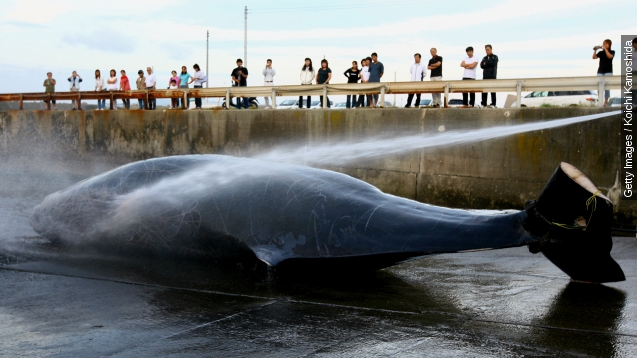After a year-long whaling hiatus, Japanese officials say they’re planning to kill 333 minke whales this year. But they claim it's in the name of science.
The Japanese Fisheries Agency said it's interested in studying minke whale migration patterns, but it doesn't shy away from the fact that the meat from the animals will eventually end up on dinner plates in Japan.
These new plans have angered many international governments, which claim Japan is using the false pretense of research to skirt anti-whaling laws.
According to the BBC, a country has only three legal options to hunt the oceanic mammals since the International Whaling Commission issued a moratorium on the practice in 1985.
It can object to the IWC’s ruling, it can get a permit for indigenous groups to hunt for subsistence, or the country can issue scientific permits, saying the hunt is being done to research the whales.
Since the moratorium, Japan has used the scientific exemption to continue hunting whales. But the U.N.’s International Court of Justice said there’s no reason to kill the whales to study them, and a group of 44 scientists from 18 countries signed a statement in agreement. (Video via Channel 7)
So it’s been established that science is a phony excuse for whaling. But plenty of other animals are hunted just for food, so why should whales be any different? It could be because Japanese hunters enter international waters, like the Antarctic, to catch their whales.
Other countries that hunt in their own seas don’t receive nearly the same scrutiny. Norway filed an objection with the IWC and set its own quota at over 1,000 minke whales per year, more than triple Japan’s planned limit.
Norwegians usually catch far fewer than that, but minke whales are the most populous baleen whales and don’t appear on the endangered species list, and Japan claims its cap of 333 whales is sustainable.
And it's worth noting, those indigenous tribes we mentioned earlier that are allowed to hunt whales for food have been practicing whaling just as long as Japanese people, making some skeptical as to why that doesn't extend to Japanese whalers.
A Japanese fleet of four ships will leave for its three-month hunt in the Antarctic on Dec. 1.
This video includes images and video from Getty Images, Jon Clark / CC BY 3.0, Len2040 / CC BY ND 2.0, Rob Oo / CC BY 2.0 and Dagur Brynjólfsson / CC BY SA 2.0.


